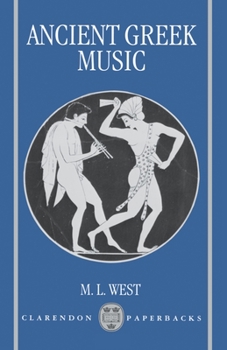Ancient Greek Music
Select Format
Select Condition 
Book Overview
Ancient Greece was permeated by music, and the literature teems with musical allusions. Here at last is a clear, comprehensive, and authoritative account that presupposes no special knowledge of music. Topics covered include the place of music in Greek life, instruments, rhythm, tempo, modes
and scales, melodic construction, form, ancient theory and notation, and historical development. Thirty surviving examples of Greek music are presented in...
Format:Paperback
Language:English
ISBN:0198149751
ISBN13:9780198149750
Release Date:April 1994
Publisher:Clarendon Press
Length:440 Pages
Weight:1.38 lbs.
Dimensions:1.1" x 5.5" x 8.5"
Customer Reviews
2 ratings
West's book is complemented by CDs
Published by Thriftbooks.com User , 14 years ago
If you find West's book interesting - it is excellent, though it is naturally very academic in its approach, being an academic monograph - I can suggest a couple of CDs that take the ancient music in West's book and put it back onto ancient instruments (well, reconstructions of ancient instruments). The two I know are Music of the Ancient Greeks and Melpomen: Ancient Greek Music. While I was more convinced by the first, there are merits to each. Naturally they often have to expand on the sparse evidence that survives. Unfortunately the cover notes to the first do not directly refer to the numbers in West's book (I have, however, given a list of references on my review of the CD). I have not seen the cover notes to the second CD though I have listened to it, so I am unable to say whether there are any references to the book's numbers in them.
An introduction both friendly and vast
Published by Thriftbooks.com User , 16 years ago
Considering that classical literature tells us that music was part of every facet of Greek society, from religious ritual to dramatic productions, athletic events to epic storytelling, it is odd that there was no substantial introduction to Ancient Greek music until M.L. West released this monograph in 1992. But we are fortunate to live in a time when ANCIENT GREEK MUSIC is available, as it is an introduction both vast and friendly, and it uses the recent advances in ethnomusicology to more accurately reconstruct Greek music and compare it to other indigenous musical traditions around the world. If you have little experience with theory, though, don't be afraid. West's discussion of the melodic and rhythmic nuts and bolts of Ancient Greek music assumes no prior training beyond knowing vaguely what an octave is. Indeed, for someone without knowledge of theory this wouldn't be a bad place to start. The Greeks described very well the basis of physical sound on which they built their music. I see the book as divided into four main parts. In the first, West discusses the role of music in Greek life, namely listing what genres were associating with what social or cultic functions. He then describes the instruments that the Greeks used, including their development and expansion, and their equivalents in nearby regions. While I was most interested in more abstract portions of the book, even this proved informative. I had never known before, for example, that brass instruments were never used to play music, but only to provide fanfares or direct troops on the battlefield. The second part of the book is the theory behind Greek music, consisting of the chapters "Rhythm and Tempo", "Scales and Modes", "Melody and Form", and "Theory". I thought it fascinating to read how the rhythm of Greek music corresponded to the longs and shorts of Greek poetry, and how Greek scales developed from the pentatonic scale still used in e.g. China and the Volga-Kama basin. The third part of the book deals with the surviving records of Greek music. West explains notation schemes and what papyruses and inscriptions have survived, and then gives us fifty pages of transcriptions. Of course, these are all fragmentary, but plenty have enough material to keep one entertained. While for the most part West treats all eras of Greek music together, it is obvious that the no musical tradition would stay static for a thousand years. Accordingly, the final part of the book is a historical synthesis tracking the development of Greek music from the archaic period to the earliest surviving Christian hymn. I'd strongly suggest this book to a number of audiences, from classicists, to ethnomusicologists or laymen interested in indigenous musical traditions, to (again) people who want to learn music theory from the ground up. Too bad OUP has priced even the paperback beyond what the average reader would be prepared to spend, though.





